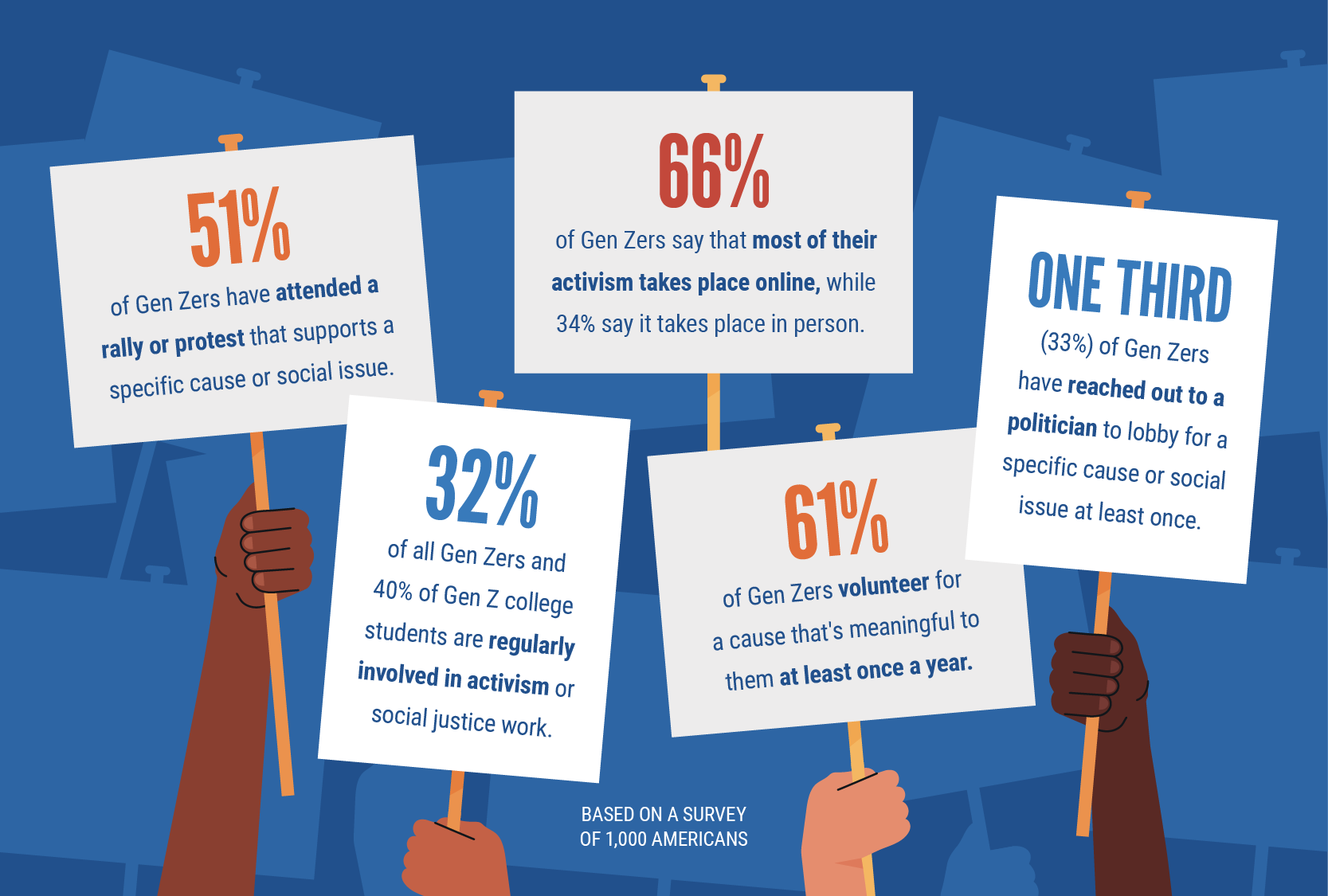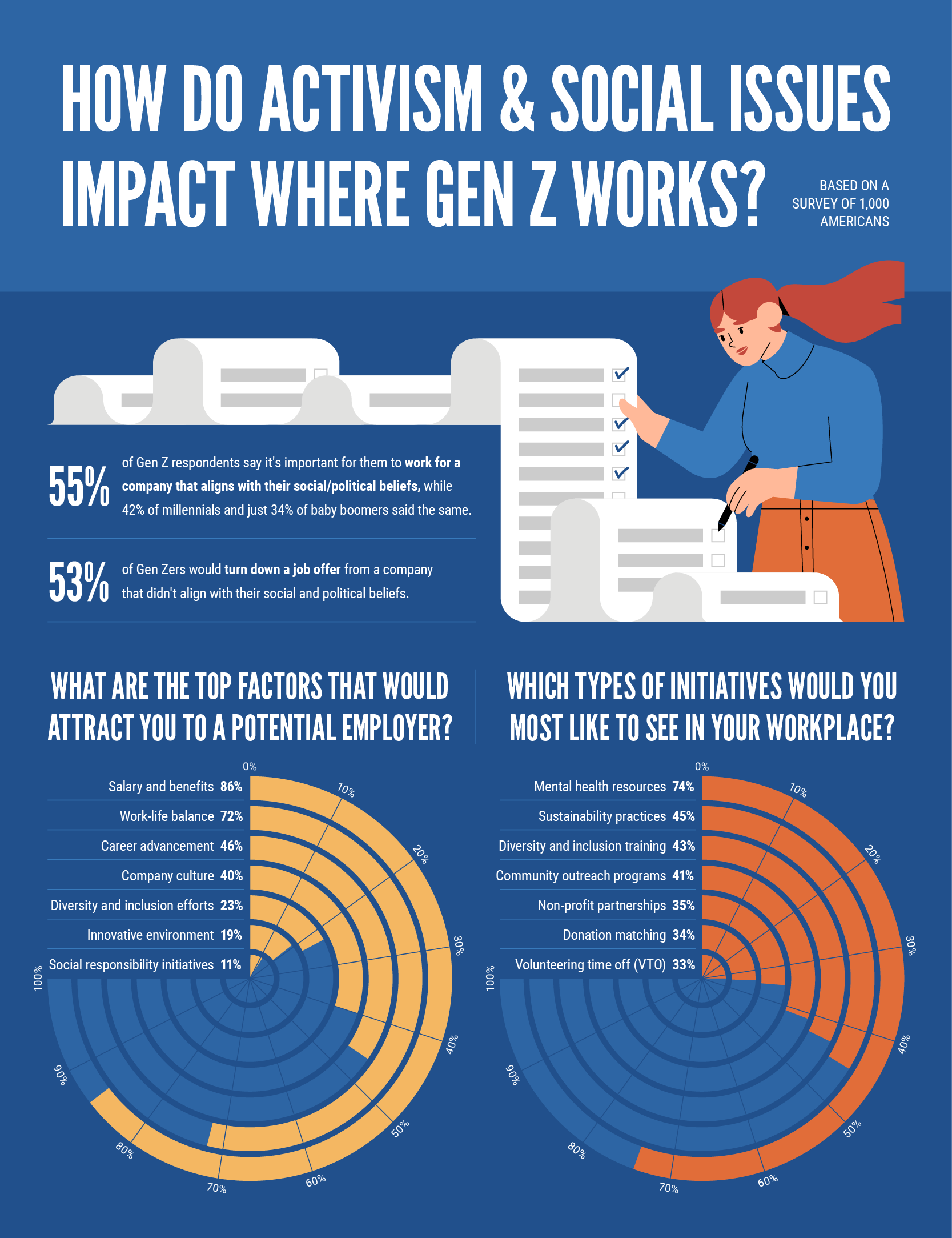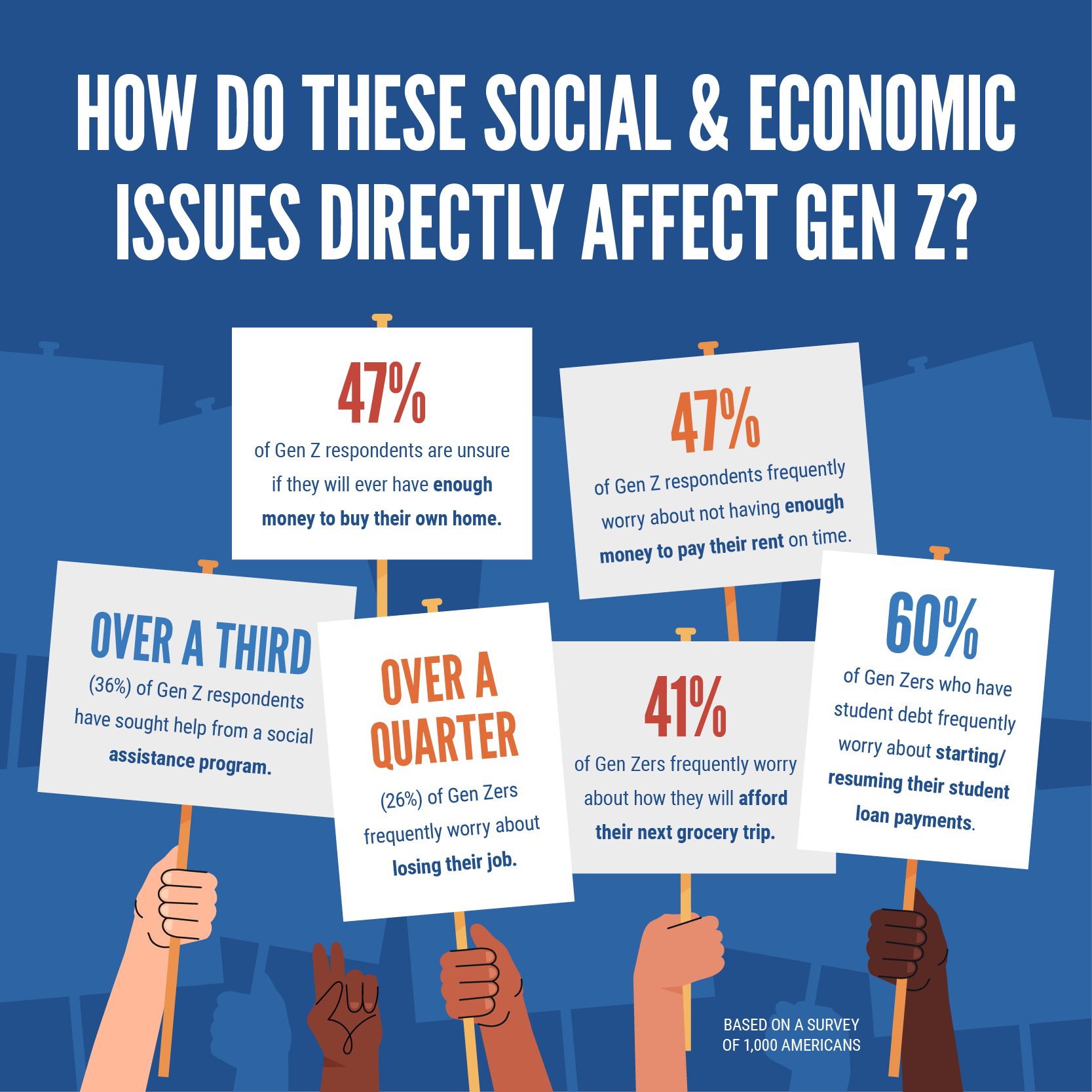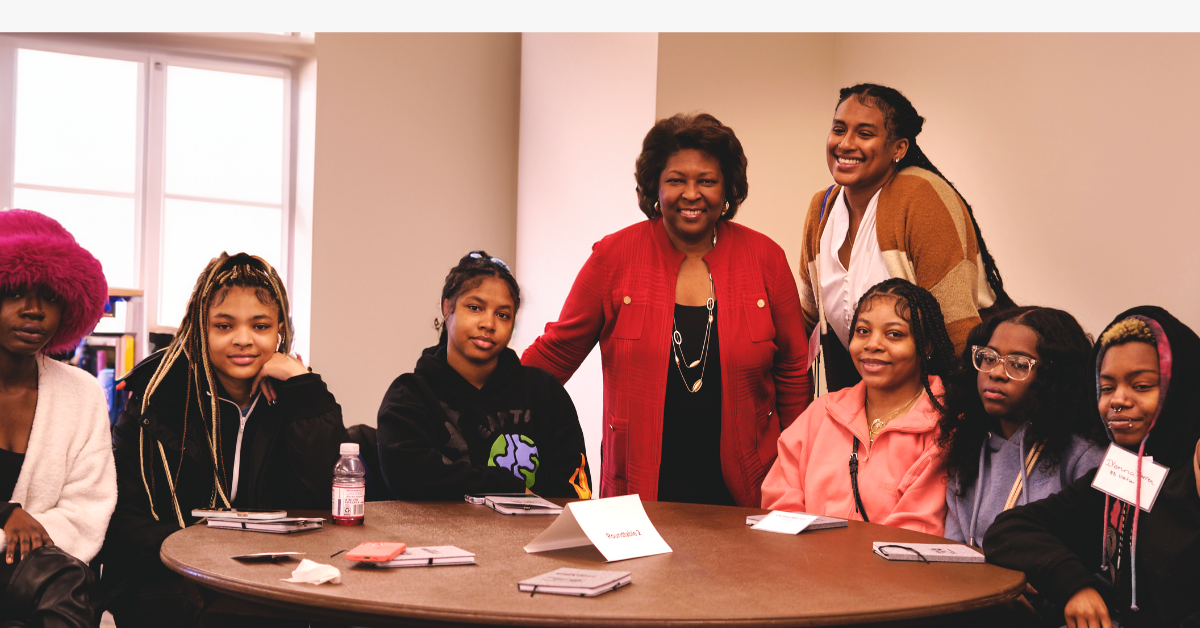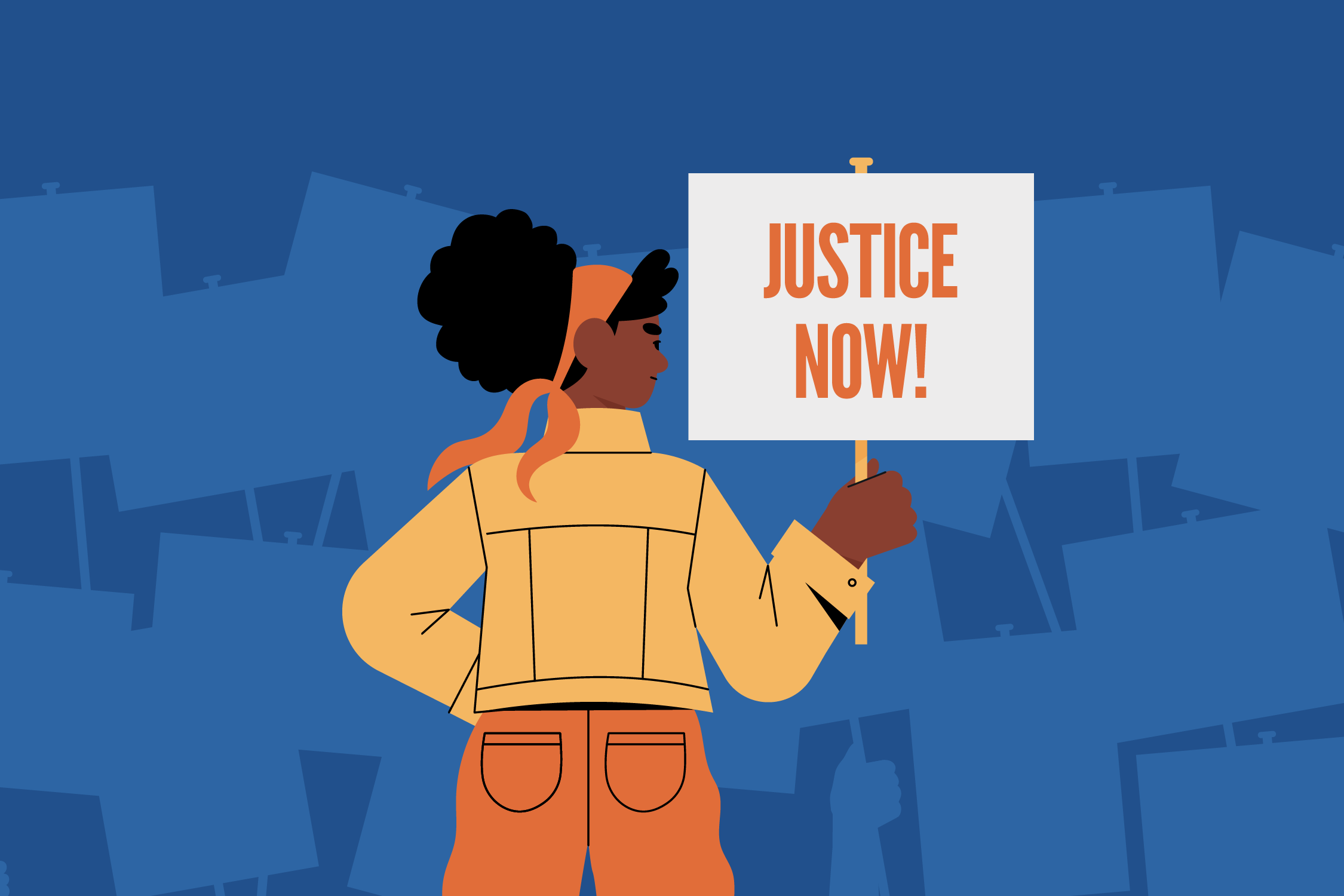
Generation Z is stepping into a world marked by economic instability, escalating college expenses, and significant environmental issues. Growing up in the digital age, they are not just witnesses to social unrest, but adept at using technology for advocacy.
To better understand Gen Z’s role in shaping our future, United Way of the National Capital Area surveyed 1,000 Americans, focusing on Gen Z’s engagement with social issues, especially in the context of an upcoming election year. We also asked questions about their motivations for activism and the impact of these causes on their career choices. This survey also compares their perspectives with those of other generations.
Our mission is to reduce barriers for the ALICE population (those who are Asset Limited, Income Constrained, Employed), aiming to create a more equitable society with equal access to health, education, and economic opportunities. We are committed to amplifying all voices advocating for tangible change — including those of Gen Z. Join us in exploring how Gen Z’s activism takes shape.
Gen Z’s Approach to Activism: From Online to Real-World
Nearly one-third of Gen Zers (32%) are regularly engaged in activism or social justice work (compared to 24% of millennials), demonstrating a significant Gen Z commitment to societal change. This engagement deepens among college students, where the percentage escalates to nearly 40%. In the realm of public demonstrations, over half of Gen Zers (51%) have participated in rallies or protests to support specific causes or social issues, with a slight increase to 56% observed among those in higher ed.
When examining the ways Gen Zers contribute to causes they care about, the largest share (27%) opts to donate to specific organizations or causes biennially. However, volunteering emerges as a more frequent form of support, with 61% of Gen Zers lending their time to meaningful causes at least once a year. This trend indicates a greater propensity for volunteering over monetary donations among Gen Z.
Gen Zers also show a readiness to engage in political advocacy, with a third (33%) having contacted local or national politicians at least once to lobby for a cause or social issue. Notably, the majority of their activism (66%) takes place in the digital realm through efforts like online fundraising and spreading awareness on social media, highlighting the significant role of technology in their advocacy efforts. In contrast, a smaller yet substantial portion (34%) engages in activism through in-person activities.
When asked what drives their activism, the largest share of Gen Zers (62%) cited moral and ethical reasons, saying that it feels like the right thing to do, followed by 51% who cited personal experience as the driving force –– either themselves or others close to them are directly affected by a specific cause or issue.
Gen Z’s Primary Concerns Are Centered Around Inflation, Healthcare, and Housing
We aimed to identify the primary causes that resonate most with Gen Z across all categories –– economic, social, environmental, and more. Our findings indicate that their top concerns are inflation/cost of living (57%), healthcare access/affordability (55%), and affordable housing (52%). Given the economic pressures of inflation, often leading Gen Z to reside with their parents, the prominence of cost of living issues is not surprising.
Other significant concerns include climate change initiatives (47%), gun control (42%), income inequality (40%), and racial equity (39%). Twenty-eight percent of teens and young adults have personally experienced gun violence — making this issue particularly impactful for them.
Additionally, Gen Z activism extends to LGBTQ+ rights (39%) and education access/affordability (38%), which rank as the eighth and ninth most important issues for Gen Z, respectively.
Generational Passions: Key Causes That Drive Different Age Groups
Next, we asked each generation which cause they felt most passionate about going into an election year within three categories –– economic, social/environmental, and human/civil rights.
When it comes to economic issues, Gen Zers are primarily concerned with inflation/cost of living (69%) and affordable housing (64%). While most other generations share these concerns, baby boomers diverge — placing a higher emphasis on food insecurity (56%) than all other economic issues.
In comparison, baby boomers show a greater concern for taxes and government spending (40%), a focus less prevalent among younger generations. Conversely, Gen Z is more attuned to issues of income inequality and employment opportunities (56%), than older generations.
Regarding social and environmental issues, Gen Z’s foremost concern is healthcare access and affordability (72%), closely followed by climate change initiatives (64%). Interestingly, healthcare access and affordability also emerge as the top concern for all other generations.
Gen Z exhibits a strong interest in issues like climate change, with 64% prioritizing this cause. They also place significant emphasis on education access and affordability (55%), and criminal justice reform (45%). In contrast, other generations show varied levels of concern for criminal justice reform: millennials report a 42% interest, while Gen X and baby boomers both express around a 27% focus on these issues.
Baby boomers demonstrate a strong interest in immigration policies, with 49% placing high importance on this issue. This perspective is echoed by 48% of boomers who view immigrants as a strengthening force in the country — highlighting their positive and proactive stance on immigration matters.
Among human and civil rights issues, Gen Z is most passionate about racial equity, with 70% prioritizing this cause that focuses on allocating resources and opportunities for BIPOC communities to thrive. Similarly, racial equity stands as the top human and civil rights concern across all other age groups. 2020’s Black Lives Matter (BLM) movement highlighted systemic racism, especially against Black individuals. This exposure led many in Gen Z and other generations to become more aware of the depth of racial inequities in the U.S.
Gen Z activism extends to strong support for gender equity (58%) and LGBTQ+ rights (57%). This heightened awareness and support for LGBTQ+ rights stems from Gen Z’s human rights orientation and practice of radical empathy. Social media and the rise of online activism have also played a significant role in increasing the visibility of LGBTQ+ issues. Gen Z, having grown up with this technology, is more exposed to diverse perspectives and experiences, including those of LGBTQ+ individuals.
Compared to older generations, Gen Z also has a greater likelihood of personally knowing individuals who are regularly discriminated against, who prefer gender-neutral pronouns, or who are seeking gender-affirming care.
55% of Gen Zers Prioritize Working for Companies That Match Their Social or Political Beliefs
55% of Gen Zers emphasize the importance of their employer aligning with their social and political beliefs, a sentiment shared by 42% of millennials and only 34% of baby boomers.
Moreover, 53% of Gen Zers would reject a job offer if the company’s values clashed with their own. Notably, a 2022 survey revealed that 77% of Gen Z consider it important that their company supports diversity, equity, and inclusion efforts.
The three primary factors drawing Gen Z to employers include salary and benefits (86%), work-life balance (72%), and career advancement opportunities (46%). In a society that praises hustle culture, Gen Z’s prioritization of work-life balance over career advancement speaks volumes. Additionally, Gen Z shows a greater interest in aspects like company culture and diversity & inclusion efforts compared to older generations.
Regarding social initiatives in the workplace, Gen Z’s top priorities are mental health resources (63%), sustainability practices (45%), and diversity & inclusion training (43%).
It’s clear why Gen Z places mental health as a top priority. When asked about the frequency of experiencing depression, anxiety, or poor mental health, 58% of Gen Z respondents report these feelings often. This is in contrast to 37% of Gen Xers and 18% of baby boomers.
The onset of the pandemic marked a turning point for many in Gen Z — exacerbating mental health challenges. According to one recent survey, almost 3 in 4 Gen Zers say the pandemic negatively impacted their mental health with a quarter of respondents saying they were diagnosed with conditions like anxiety, depression, ADHD, or PTSD during the height of COVID.
The Impact of Social Issues on Gen Z
41% of Gen Z respondents often worry about affording their next grocery trip, with 67% reporting a shift towards less healthy eating due to the high costs of nutritious food. This trend of food insecurity is not only affecting Gen Z but also extends to the ALICE (Asset Limited, Income Constrained, Employed) population as a whole.
United Way NCA’s 2023 ALICE report, shows that of the 319,565 households in D.C., 42% had income below the ALICE Threshold of Financial Survival in 2021. These families, often overlooked by traditional poverty measures, face unique challenges. The Federal Poverty Line (FPL), though updated annually, is based on thresholds established in 1963 and fails to reflect modern economic conditions. This outdated measure, along with the ineligibility of many ALICE households for federal benefits and the rising cost of living, contributes to their increasing financial hardship.
In the National Capital Area, a striking 40% of Gen Z adults (ages 18-25) fall within the ALICE population, and an additional 29% live in poverty. Their situation is worsened by escalating living costs, where prices increase faster than wages –– a trend expected to intensify with continued high inflation into 2024 and beyond. So Gen Zers will continue to be negatively impacted as more become working adults. The ALICE population, often grappling with making tough decisions between basic necessities like rent and food, is especially vulnerable. Reports show that a single adult in this area needs a minimum of $502 per month just for groceries.
Our survey results reveal that 36% of Gen Z respondents have sought help from assistance programs for needs like food, housing, or healthcare, underscoring the growing need for support among this generation.
Further, nearly half (47%) of Gen Z respondents often find themselves concerned about affording rent or mortgage payments. This financial strain extends to education, with 60% of those with student loans worried about their repayment, and 66% of Gen Zers with any form of debt anxious about paying it off.
Job security is another significant concern, as over a quarter (26%) frequently fear losing their employment. Additionally, 47% of Gen Z respondents express uncertainty about their prospects of homeownership in the future.
Closing Thoughts
Gen Z is actively using technology to address a broad range of issues, from racial equity to food insecurity. This advocacy is increasingly shaped by the escalating cost of living, which profoundly affects the ALICE (Asset Limited, Income Constrained, Employed) population. In the National Capital Area, there are nearly 500,000 ALICE households that are working yet cannot afford basic necessities like food or rent.
At United Way of the National Capital Area, we are committed to reducing disparities and creating a more equitable society where everyone in our community has fair access to health, education, and economic opportunity. Our mission is vast and cannot be accomplished alone.
Discover how you can contribute to change by volunteering or advocating for United Way NCA. Explore the impact we’re making in the National Capital Area and learn how your involvement can make a meaningful difference today.
To read the full United Way NCA 2023 ALICE reports and learn more about the financial burden that the ALICE population faces on a daily basis in the National Capital Area, visit unitedwaynca.org/alice.
Methodology
We surveyed 1,000 Americans, ensuring representation from each generational cohort — Gen Z, millennials, Gen X, and baby boomers –– as well as representation across geographic regions, gender, and racial backgrounds. We asked each generation about the social/political issues they are most passionate about. To gain a deeper understanding of Gen Z activism, our questionnaire covered their involvement in activism, social change, and the influence of social issues on their workplace decisions, mental health, and broader lives. The survey was carried out from October 20th to October 25th, 2023.
